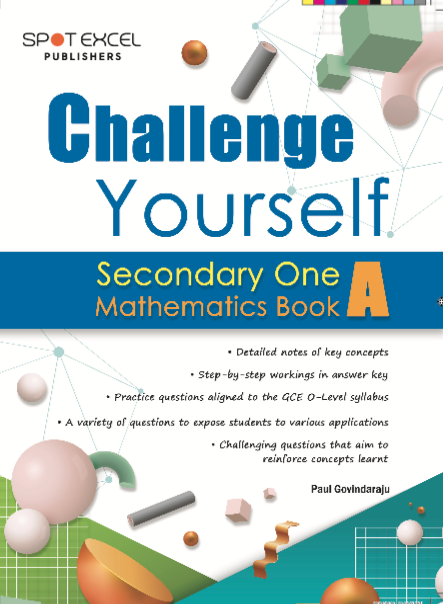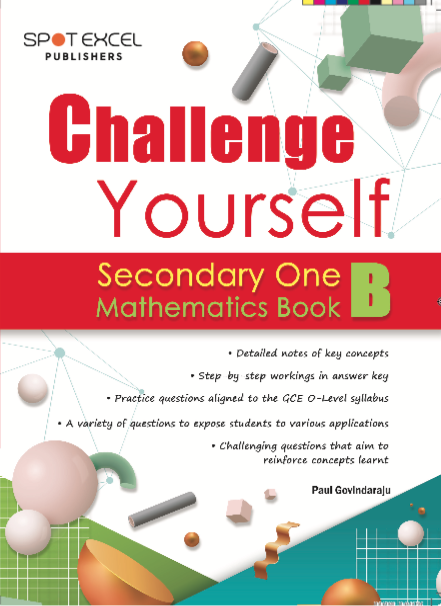Paul Govindaraju is a former educator whose experience spans 20 years of teaching secondary school Mathematics in both private and MOE schools. A first-class honours recipient from the National University of Singapore (NUS) in Mechanical Engineering, Paul has also attained a Master of Science from NUS and a Post Graduate Diploma in Education from the National Institute of Education (NIE). His knowledge in engineering has helped students to understand the practical applications of Mathematics. A fervent believer that all students can excel in Mathematics, Paul continuously supports students to build their confidence in achieving their potential.
Paul is the author of the Challenge Yourself Secondary One A & B Mathematics series. This series contains practice questions which are aligned to the current GCE O-Level syllabus, with detailed notes of key concepts and step-by-step workings in the answer keys. There are a variety of questions to expose students to the various applications of Mathematics, with challenging questions aiming to reinforce concepts learnt. In today’s post, he shares more about the interesting real-life applications of Mathematics, and how parents can help their child to learn Maths more effectively.
About your book
1. How will this book series help students to master Maths effectively?
This series provides a structured approach in learning Mathematics.
There are drill-and-practise questions to strengthen the students’ foundation. Most drill-and-practise questions will be similar to the worked examples for students to build their confidence.
There are also the Challenging / Examination type of questions to stretch the students’ ability to solve higher-order thinking questions.
2. What are some of the key concepts that students must grasp in order to do well in Maths?
Students need to have conceptual understanding of the topics instead of just instructional understanding.
3. Are there any ‘best methods’ that students can use to improve their understanding of Maths concepts, on top of frequent practice?
Students need to be exposed to the different scenarios / types of problems where the concepts can be applied. This will not only allow students to appreciate the beauty of the concept learnt, but it will also provide students with the opportunity to think laterally in terms of problem-solving.
4. How can students avoid making common mistakes?
For every mistake made, students need to return to the question and understand the concepts involved, then try a few more similar questions in order to reinforce what they have learnt.
5. How can parents play a role in helping their children at this level?
One key role that parents can play is supporting their children by getting them to be disciplined in practising Maths. One way to do this is to create a timetable and dedicate time for Maths practice. Parents can support their children by enforcing this timetable.
Parents can also provide an encouraging environment for their children to learn Mathematics. Giving words of encouragement/praises to their children when they have achieved small successes will definitely spur them to put in more effort.
6. Lastly, do you have any additional advice for students who are studying Maths?
Students should practise regularly, clarify doubts immediately and try a variety of questions.
About Yourself/Work/Expertise
1. Why did you choose to study Mechanical Engineering and Science?
I like Maths and I see Mechanical Engineering as a natural area where Maths is applied to solve real-life problems.
2. How have these subjects added on to your expertise in teaching Maths?
These subjects have helped to provide a practical application for the knowledge acquired in Maths. The subjects also strengthen one’s ability to think logically and in a structured manner when solving problems.
3. From your experience, what would you say to encourage students to take up Mechanical Engineering and Science? Why?
Students who are keen to develop a structured approach to problem-solving with the application of Mathematical knowledge should consider taking up Engineering subjects.
4. What are some of the practical applications of Maths in everyday life that people often overlook?
All appliances/tools that we use have some form of mathematical considerations used in their application or design. For example, the lift that we use daily considers the maximum weight load that it can support before it is released for use.
5. Could you share more about how you have applied your Engineering expertise to make lessons more engaging / to help your students to understand Maths better?
One good example will be to teach students the use of similar figures. Not many students know that before any construction of a mega structure, scale models are built and tested to assess their strengths/weaknesses before the actual construction begins.
6. How has the Maths syllabus evolved over the last two decades?
The Maths syllabus has shifted over the years from routine problems where students regurgitate steps for problem-solving questions, to the need for identifying suitable concepts that can be used to solve the problem. In particular, the introduction of explanation questions in the examinations provides opportunities for students to make their thinking visible.
7. Do students need to develop any additional skills in order to excel in Maths?
Generally, it will be good for students to have a logical mind and systematic problem-solving skills to excel in Maths.
8. What can students do to help build up their confidence in Maths?
For weaker students, small successes will definitely boost their confidence. Students cannot escape from the need to do drill-and-practise questions in order to gain mastery over some Maths procedures.


